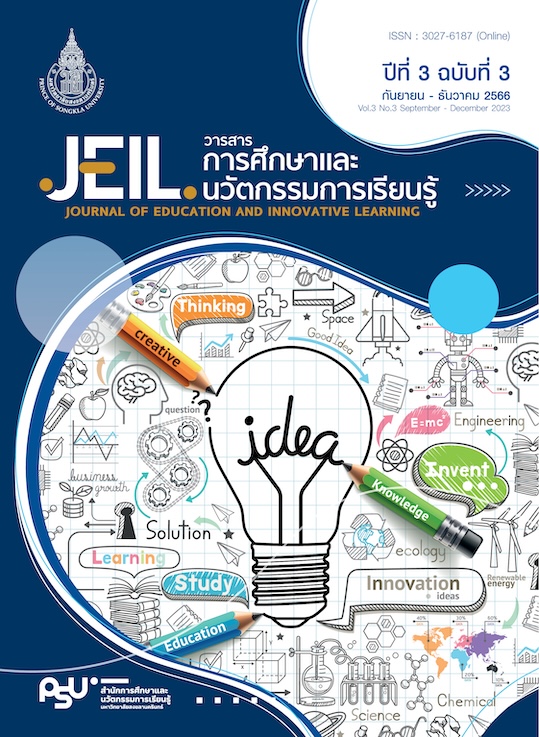แนวคิดการสอนคณิตศาสตร์ที่ส่งเสริมทักษะการคิดเชิงนวัตกรรม
Main Article Content
บทคัดย่อ
ทักษะการคิดเชิงนวัตกรรมเป็นคุณสมบัติเชิงกระบวนการคิดที่สำคัญของนวัตกร ซึ่งสามารถส่งเสริมให้เกิดขึ้นได้ในรายวิชาคณิตศาสตร์ บทความวิชาการนี้มีวัตถุประสงค์เพื่อนำเสนอลักษณะการสอนคณิตศาสตร์ที่ส่งเสริมทักษะการคิดเชิงนวัตกรรมของนักเรียนในระดับการศึกษาขั้นพื้นฐาน สาระสำคัญของบทความประกอบด้วย 1) ความหมายและองค์ประกอบของทักษะการคิดเชิงนวัตกรรม ซึ่งทักษะการคิดเชิงนวัตกรรมเป็นความสามารถในการคิดอย่างมีประสิทธิภาพให้เกิดการต่อยอดหรือพัฒนาสิ่งใหม่ แนวคิดใหม่ หรือแนวทางใหม่ที่ดีกว่าเดิมเพื่อแก้ปัญหาหรือพัฒนาความเจริญงอกงามให้แก่สังคมผ่านการต่อยอดจากจินตนาการและการสร้างสรรค์ มี 6 องค์ประกอบที่ต่อเนื่องสัมพันธ์กัน ได้แก่ การวิเคราะห์บริบท การสร้างแนวคิด การร่วมมือกับผู้อื่น การสะท้อน การนำเสนอ และการประเมิน 2) ลักษณะการสอนคณิตศาสตร์ที่ส่งเสริมทักษะการคิดเชิงนวัตกรรม คือ เป็นการสอนที่มีลำดับขั้นตอนชัดเจนและสอดคล้องกลมกลืนกับทักษะการคิดเชิงนวัตกรรมทั้ง 6 องค์ประกอบ ใช้สถานการณ์ปัญหาเป็นของนักเรียนเป็นจุดเริ่มต้นในการสร้างนวัตกรรม พัฒนาให้นักเรียนมีความเข้าใจเนื้อหาคณิตศาสตร์ก่อนที่จะลงมือสร้างนวัตกรรม เด่นชัดด้านทักษะการเชื่อมโยงทางคณิตศาสตร์ ทำให้นักเรียนอธิบายได้ว่าใช้ความรู้ใดในการพัฒนานวัตกรรม และดำเนินการสอนและติดตามความก้าวหน้าในการพัฒนานวัตกรรมเป็นระยะ และ 3) ความเชื่อมโยงระหว่างเนื้อหาทางคณิตศาสตร์ตามหลักสูตรแกนกลางการศึกษาขั้นพื้นฐานกับกระบวนการพัฒนานวัตกรรม คือ เนื้อหาทางคณิตศาสตร์สามารถนำไปใช้ในกระบวนการพัฒนานวัตกรรมได้ทุกขั้นตอน
Article Details

อนุญาตภายใต้เงื่อนไข Creative Commons Attribution-NonCommercial-NoDerivatives 4.0 International License.
เนื้อหาและข้อมูลในบทความที่ตีพิมพ์ในวารสารการศึกษาและนวัตกรรมการเรียนรู้ ถือเป็นข้อคิดเห็นและความรับผิดชอบของผู้เขียน ซึ่งกองบรรณาธิการวารสาร ไม่จำเป็นต้องเห็นด้วยหรือร่วมรับผิดชอบใด ๆ และไม่สงวนสิทธิ์การคัดลอกบทความเพื่อใช้ประโยชน์ทางวิชาการ แต่ให้อ้างอิงข้อมูลแสดงที่มาของบทความทุกครั้งที่นำไปใช้ประโยชน์
เอกสารอ้างอิง
Australian National Training Authority. (2002). Innovation ideas that work for training package developers. Brisbane Queensland: Author.
Bureau of Educational Innovation Development. (2008). Thinking development “Using the GPAS process”. Bangkok, Thailand: Educational Management Innovation Development. [in Thai]
CDIO. (2022). The CDIO™ INITIATIVE is an innovative educational framework for producing the next generation of engineers. Retrieved form http://www.cdio.org/about
Dechakup, P., Yindeesuk, P., & Chantraukrit, P. (2023). Active learning strengthens performance. Bangkok, Thailand: Chulalongkorn University Press. [in Thai]
Hussein, H. B. (2023). Global trends in mathematics education research. International Journal of Research in Educational Sciences, 6(2), 309-319.
Institute of Academic Development. (2021). Active learning management to innovation with higher thinking system process by GPAS 5 steps for mathematics learning group. Bangkok, Thailand: Author. [in Thai]
Kholikova, D. M. (2021). Development of innovative thinking skills in higher education students. International Scientific Journal Theoretical & Applied Science, 98(6), 549-552. doi:10.15863/TAS.2021.06.98.64
Lazuardi, A. R., Slamin, & Dafik. (2021). The analysis of students' creative-innovative thinking skills in solving total dominator coloring under the implementation of research-based learning model. Journal of Physics: Conference Series, 1836(1), 012058. doi:10.1088/1742-6596/1836/1/012058
Mubarak, Z. K., & Selimin, M. A. (2023). Significance of innovative learning skills in the era of education 4.0. International Journal of Sustainable Construction Engineering and Technology, 14(3), 339-352.
National Council of Teachers of Mathematics. (2014). Principles to actions: ensuring mathematical success for all. Reston, VA: Author.
Office of the Basic Education Commission, & Surindra Rajabhat University. (2023). The development of active learning management competency with GPAS 5 Steps advanced thinking process of teachers to create student’s innovation. Bangkok, Thailand: Bureau of Educational Innovation Development. [in Thai]
Office of the Basic Education Commission. (2017). Indicators and core content of mathematics learning group (Revised edition 2017) according to the Basic Education Core Curriculum 2008. Bangkok, Thailand: The Secretariat of the House of Representatives. [in Thai]
Office of the Education Council. (2017) The National Scheme of Education B.E. 2560-2579 (2017-2036). Bangkok: Prigwan Graphic. [in Thai]
Office of the National Economic and Social Development Council. (2018). National strategy B.E. 2561-2580 (A.D 2018-2037) published in the government gazette. Retrieved from http://nscr.nesdc.go.th/wp-content/uploads/2023/06/NS_PlanOct2018.pdf [in Thai]
Royal Academy. (2013). Dictionary of educational terminology. Bangkok, Thailand: Arun Printing. [in Thai]
Sinlarat, P. (2017). A new paradigm shift: Thai teachers can effectively teach 4.0 children. In S. Donprasit (Ed.), Academic Conference of Teachers Council 2017 (3-18). Bangkok, Thailand: OTEP. [in Thai]
Siphai, S. (2021). Productivity research for higher education students. In P. Sinlarat, & N. Meesaen (Eds.), Productive education: teaching and learning to create productivity and innovation (166-177). Bangkok, Thailand: Chulalongkorn University Press. [in Thai]
Sulistiyono, B., Slamin, Dafik, Wangguway, Y., & Jabbar, Z. L. AL. (2020). Students’ creative-innovative thinking skill in solving rainbow antimagic coloring under research-based learning model. Journal of Physics: Conference Series, 1538(1), 012096. doi:10.1088/1742-6596/1538/1/012096
Tanyarattanasrisakul, M. (2023). Learning management by GPAS 5 steps process to enhance students’ innovators at the basic education level. Journal of Education and Innovative Learning, 3(1), 71-87. [in Thai]
Tanyarattanasrisakul, M., Rodyoo, M., Sriprom, S., & Chaowatthanakun, K. (2022). The development of mathematical connection and innovative thinking skills of matthayomsuksa 6 students by using GPAS 5 steps learning process through professional learning community. Journal for Social Science Research, 13(2), 129-149. [in Thai]
Taylor, S. P. (2017). What is innovation? A study of the definitions, academic models and applicability of innovation to an example of social housing in England. Open Journal of Social Sciences, 5(11), 128-146. doi:10.4236/jss.2017.511010
Tiyaswati, I., Sarwanto, & Sukarmin. (2021). Students’ creative and innovation skill on chapter of Newton's law using SSCS learning model. Journal of Physics: Conference Series, 1806(1), 012120. doi:10.1088/1742-6596/1806/1/012120
Yiğ, K. G. (2022). Research trends in mathematics education: A quantitative content analysis of major journals 2017-2021. Journal of Pedagogical Research, 6(3), 137-153.
Zabalawi, I., Kordahji, H., & Mourdaa, R. (2022). The ‘New’ normal of business education in a post COVID era: The CDIO approach. In A. Badran, E. Baydoun, J. Mesmar (Eds.), Higher education in the Arab world (115-150). New York, NY: Springer.


